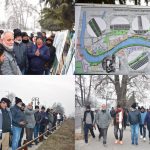Unemployment in Kashmir has reached such a critical juncture where even the literati lot is also not able to find gainful employment. That too, holding a Ph.D. would force a person down, selling dry fruits and fresh juice from vendor stalls-dismaying and disheartening, a candid and bitter indictment of the economic and social challenges staring the region in the face. This is a situation that evidences the job opportunities shortage and also poses serious questions about the path on which humanity moves. In a way, when higher education, normally thought of as the way to success, is so poorly rewarded, there is an even bigger system failure. It is the deplorable condition of Kashmir’s educated unemployment that calls for an immediate reform in economic development, involving sustainable job opportunities where youth potential is tapped and further stagnation and social disillusionment are prevented.
Youth exodus: In search of stability
Unemployment in Kashmir has reached unprecedented heights, with the corresponding trail of despair amongst its youth. The sight of highly educated young men who have spent years in academic pursuits standing behind a vendor’s stall is a heart-rending reflection of the region’s systemic failures. Education, once seen as a ticket to stability, no longer has such an assurance of promise. As academic qualifications continue to be extended, the avenues of employment available are rapidly shrinking, bringing many into question over what the meaning of their education really is. On the personal front, I too represent the unemployed youth of Jammu and Kashmir. Having every requisite for being on a gazetted post, still then, I am in search of a deserving position. I too had to move to Punjab with my husband as there are bleak “ready to opt opportunities” in my homeland. Due to that, I have to be content with a low-grade professional engagement, leaving my hard earned credentials entrenched with the sweat and youth of my parents, on the dust laden rack. When struggles of this emotional magnitude are struggled with, the effort and resources expended seem starkly evident.
It is not only a failure of the job market but also a deep-seated injury at the level of society and governance. Given the rich cultural heritage of Kashmir, supported by its natural resources, the region suffers from the lack of industrial development, inadequate infrastructure, and political instability that, in a cumulated way, stifles economic growth. This makes it imperative for the government to act in this crisis hence formulating policies which generate productive employment opportunities inside the homeland and minimizing the need of the youth to go abroad in search of jobs.
Fragmentation of Familial Ties and Cultural Bonds
As the youth migrates for better prospects, they usually make lives away from the motherland and lose their roots forever. This is not only a physical separation but also a cultural and emotional chasm that is hard to fill. The parents staying behind feel an acute loneliness; a dream of growing old with their children thus gets shattered. Traditional social bonds, which helped glue families and societies together, slowly get dislocated, and along with this, an invisible crisis follows. This destruction of bonding is not an issue of only geographical shifting of people but also of values. Ask us about the heartache of living away from our family and homeland! When even benevolent and lovable people surround us and, most particularly, the warm-hearted Punjabis, even then, the longing for our family and native land tears our heartstrings to tatters.
Aristotle urged that family is the very basic unit of the society on which a state would found and function. According to him, “the family is the association established by nature for the supply of man’s everyday wants.” Disintegration of this institution amounts to turning against the blood and flesh of society, leading to insemination process inimical to the entire society. The strong intergenerational bonds that earlier distinguished Kashmiri society are weakening, and the transmission of cultural values and traditions is being disrupted. When these descendants disperse into every part of the world, the rich heritage of Kashmir becomes diluted with their disengagement from their cultural roots.
Evolution of Old Age Homes: A Response to Societal Shifts
The mushrooming of old age homes in Kashmir is a move further towards individualism-a society in which such institutes considered unthinkable. The idea of home as a place of warmth and security, where generations linked to one another, is being reconstituted along lines that are both alien and unsettling.
It is a double-edged sword since the elderly generation in Kashmir, on one hand, understands the compulsion that made their children migrate to other countries in search of better opportunities. On the other, they are faced with the brute reality of growing old in isolation as the joint family system, which is a cultural tradition where generations together would live under one roof, is fast losing ground. Instead, a new normal is fast setting in where elderly parents have either to fend for themselves or find shelter in an old age home-a concept alien and unheard few years ago amongst Kashmiris.
This trend gives rise to pertinent moral and ethical questions. Is it fair on the part of the children that they should pursue their career and personal growth at the cost of well-being of their parents? Does the pursuit of success as an individual free him from his responsibilities towards the family? These questions bring to mind the ethical philosophies of Immanuel Kant, who believed that the only moral action is one done out of duty rather than inclination. From a Kantian perspective, one’s duty in taking care of their parents remains an obligation regardless of the distance or of personal ambition.
Above all, the growing tolerance for old age homes is a reflection of the movement of the societal wheel towards utilitarianism, whereby the greatest good resides in economic success, rather than in the perpetuation of family ties. This defies the very traditional values and questions the moral direction guiding modern societies.
The Role of Government: A Call to Action
Unemployment in Kashmir, coupled with the mass exodus of its youth, is not an economic issue; it is a philosophical and cultural predicament that needs immediate attention. A region stands at a crossroads where decisions to be made today will shape the future of its society. It’s high time that all the stakeholders-government, civil society, and diaspora-come forward and try to address the root causes of the crisis.
This transformation at every level essentially needs an active role to be played by the government. A serious employment creation attempt within Kashmir should be in tune with the distinctive strengths of the region and an investment in its human capital. The generation of employment in higher education and school education departments, industrial development, improvement of infrastructure, and political stability is basic to creating a job market that will thrive with its educated youth.
A Philosophical Reconsideration: Final Comments
If one reflects upon the present scenario in Kashmir, the question is: Where do we go from here? It is a question of what kind of society we are aiming to build for the future generations. How far we would be able to reclaim the lost hope and promise along with restoring the social and cultural bonds that have long defined Kashmiri identity will depend on the answers to these questions.
In the words of George Santayana, “those who cannot remember the past are condemned to repeat it.” As we tackle modern life’s challenges, may we not forget many of those timeless values which have served generations of societies and cultures in good stead, lest progress come at the price of some of our most basic human relationships.
(Author is PhD & Postdoc fellow in Environmental Sciences and represents the unemployed youth. Feedback at: [email protected])










